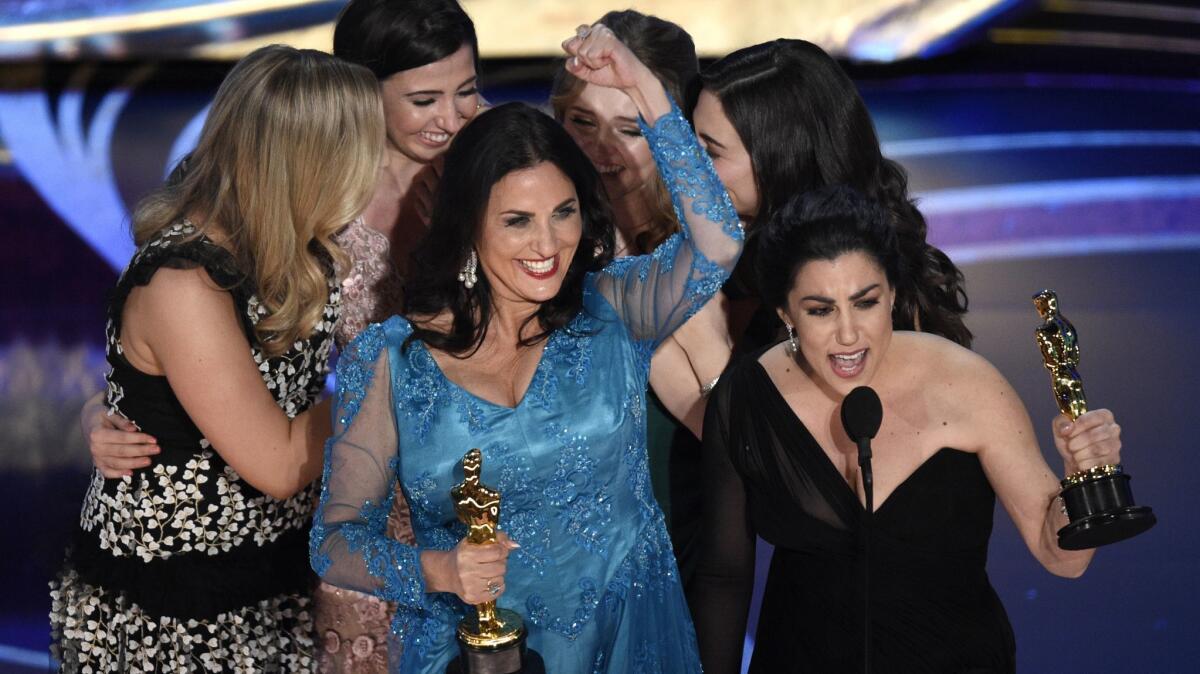Opinion: The Oscars talked about periods and it was glorious

“I’m not crying because I’m on my period, I’m crying because a film about menstruation just won an Oscar!”
So began director Rayka Zehtabchi’s ebullient acceptance speech for her film “Period. End of Sentence,” which won the Academy Award for best documentary short subject on Sunday night. Female directors are rarely honored by the academy; Zehtabchi was the only one nominated in doc shorts. (There were no female nominees in the best director category this year.) The mere visual of Zetabchi and producer Melissa Berton, flanked by four other women and two men, accepting the award was striking. Hearing both “period” and “menstruation” spoken aloud onstage was even more notable.
At that particular moment, about 5% of the world had or was about to get its period. (A little fast math: half the people in the world get periods, periods last around five days, subtract kids and the post-menopausal, call me Euler, thank you.) And while “Period. End of Sentence” approaches the stigma of menstruation through the lens of women in rural India, America’s Oscar audience didn’t need to have seen the film to connect with some of the core issues it addresses.
Telling people with periods that their experiences should be kept under wraps is dismissive at best; at worst, it’s dangerous.
In the United States, we’re often led to believe that speaking about our periods — whether it be the associated pain, the day-altering inconvenience or the simple fact of their existence — is grotesque, gauche, even unprofessional. We are to sanitize our menstrual cups, heating-pad our lower abdomens and handle the headaches silently.
How are we taught to accept this reality? In both subtle and crude ways.
I knew that periods were something to be whispered about — that tampons should be slipped, not tossed, to a friend in need, for instance — from the time I first learned the word. That message has been reinforced again and again over the years, as in my mid-20s when my friend’s husband covered his ears and literally walked out of the room after another friend flatly mentioned hers was en route.
My friend’s husband isn’t a known jackass; he’s an otherwise-supportive, feminist man. If men like him couldn’t handle it, my thinking went, there were plenty of others who couldn’t either. Best to keep things comfortable and pretend that a process I’ve personally navigated upward of 200 times and taken all manner of medication to modify or moderate the symptoms of doesn’t exist.
There was power in hearing periods spoken about openly at an event that’s inherently about elegance, glamour and restraint. It’s a necessary piece of the academy’s slow movement toward greater inclusion.
Seeing more of our experiences on-screen and onstage — and hearing them named — may not be social revolution. But in an industry where women are expected to behave with performative ease at all times, the mere suggestion that one could be hiking their couture up to swap out their tampon on the same evening as posing for pictures and celebrating art felt new.
While the specific ways and degrees to which menstruation is stigmatized are culturally contextualized, women’s pain is almost universally minimized and mistreated. Difficult periods can be the symptom or cause of a wide variety of health problems, including endometriosis and anemia. Telling people with periods that their experiences should be kept under wraps is dismissive at best; at worst, it’s dangerous. Advocates and writers who try to discuss these issues are often constrained to doing so in female-facing outlets.
The conceit, it seems, is that no general audience is interested in better understanding periods.
I’ve had one of the most onerous periods of my life this week. It’s kept me from exercising, messed with my appetite and energy, and required that I lay horizontal for hours that I’d have otherwise spent sitting at my desk. (This is a relatively light set of symptoms; many people have far more debilitating periods.)
Enter the Fray: First takes on the news of the minute from L.A. Times Opinion »
Thankfully, I have a workplace flexibility that most don’t. When I worked in an office, I never, not once, told a supervisor when I was in pain and would have been better off working from home. I imagined they’d perceive me as weak or dramatic; I didn’t feel that those words were available to me; I don’t feel that a general audience wants to read them now.
And maybe you don’t. But discomfort applies pressure; that’s a start.
Last night, a woman stood on stage in an embroidered evening gown and was honored for her work on menstruation stigma. It was rad as hell. Let’s take the conversation forward from there and see what moves.
Melissa Batchelor Warnke is a contributing writer to Opinion. Follow her on Twitter @velvetmelvis.
More to Read
A cure for the common opinion
Get thought-provoking perspectives with our weekly newsletter.
You may occasionally receive promotional content from the Los Angeles Times.











